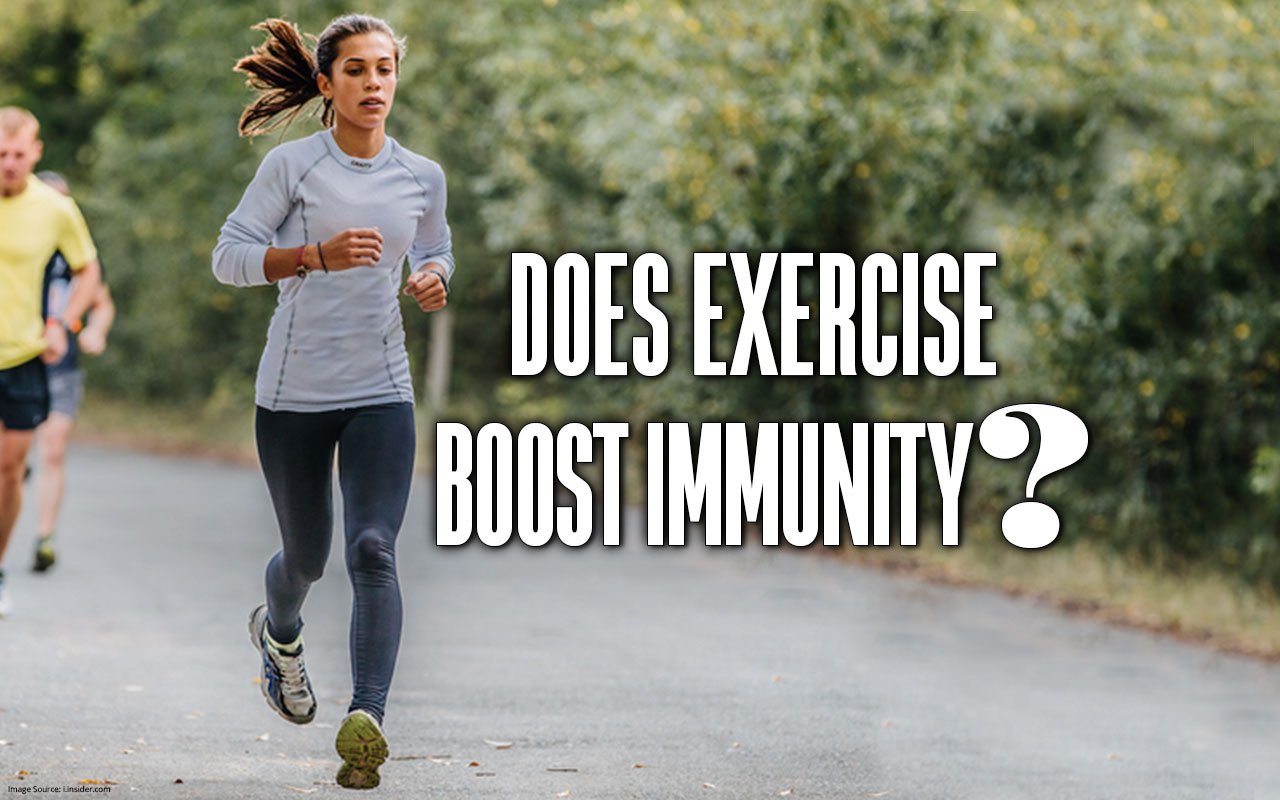
We all know exercise boost immunity. It increases blood flow, lowers stress and inflammation, and can enhance antibodies.
You’ve probably already learned how to defend yourself against the novel coronavirus—frequent handwashing, social distancing, and, to a certain extent, maintaining a healthy diet to keep your body as healthy as possible.
Regular exercise is another essential component of maintaining your general health that may benefit you right now to improve your immune system.
Of course, lacing your sneakers for a run may feel like the last thing you want to do when schedules are all over the place and gyms are shut.
However, performing simple everyday tasks, like walking more or stretching regularly, may be a powerful weapon in the battle against infection.
The catch is that not all exercise is beneficial to your immune system, especially when a new viral danger lurks outside.
We went through the science and spoke with specialists who have studied exercise’s effect on the immune system to clarify how it relates to immunity. Here is how to make the most of your workouts for your general health, especially during a pandemic.
So, can exercise boost your immune system?
Even though shelter-in-place and stay-at-home orders have been set up across the country, top officials like the CDC and WHO continue to advocate for regular exercise—and with good cause. A 2019 scientific study in the Journal of Sport and Health Science found that physical activity may enhance immune response, lower sickness risk, and reduce inflammation.
The researchers examined “acute exercise,” which means moderate to vigorous intensity for less than an hour. (The study looked at walking, but it might also represent an elliptical session, a spin class, or even a run.) David Nieman, DrPH, a professor in the biology department at Appalachian State University and director of the university’s Human Performance Laboratory, explains to health that only a small number of immune cells usually circulate throughout the body. These cells like to dwell in lymphatic tissues and organs, such as the spleen, where your body destroys viruses, bacteria, and other microorganisms that cause illness.
Increased blood and lymph flow as your muscles contract promote more excellent circulation of immune cells, which allows them to travel the body faster and in more significant numbers, according to Nieman.
Exercise activates specialized immune cells known as natural killer cells and T cells to seek and destroy germs (such as viruses). Participants who took a 45-minute fast walk saw an increase in immune cells that flocked about the body after three hours, according to Nieman’s 2019 review.
While you get an immediate reaction from your immune system when you exercise, it fades—unless you continue to exercise regularly. “This all happens again if you go for 45 minutes of exercise the next day,” Nieman adds. “It all adds up over time. “The easiest method to get fit is just to do it, but one’s attitude is the most difficult thing to change about oneself.” According to a study by Nieman and his crew—published in 2011 in the British Journal of Sports Medicine—those who engaged in moderate-intensity aerobic exercise five or more days per week reduced their incidence of upper respiratory tract infections by more than 40% over 12 weeks.
According to Nieman, consider the long-term immune benefit of exercise like this: Consider a housekeeper who comes over to clean your home for 45 minutes each day on most days of the week. It will appear far better than if no one ever came when someone first enters the house. However, the more frequently the housekeeper returns, the cleaner and neater your home will appear. “Exercise is a housekeeping activity since it helps the immune system patrol the body and detect and avoid germs and viruses,” Nieman adds. So, you won’t be able to exercise one day here and there and expect your immune system to clear up. However, if you regularly return for additional movement, your immune system is better prepared to destroy germs. According to another 2018 review paper published in Frontiers in Immunology, this remains true as you grow older.
Another advantage of physical activity is that it reduces inflammation in the body, which can also help to boost immunity. Some research, such as the 2004 study in the Journal of the American Geriatrics Society, links decreased inflammatory indicators to those who exercise more often and have higher fitness levels. That is, according to Nieman, linked exercise boost immunity. “Immune systems that are overly stressed tend to work in a chronically inflamed state, making it more difficult to combat infection,” he adds. Reduce inflammation by increasing your activity level.
What is the best type of exercise to boost your immunity?
According to Nieman, aerobic activities, such as walking, running, or cycling, were the focus of most studies. When walking to get the advantages, it’s best to go faster. “For most people, we are talking about a 15-minute mile,” Neiman explains of the average pace that produced promising results in his research. “That’s enough of a stimulus to get immune cells into circulation. “You’ve likely heard the expression, ‘If you’re not tired after a run, it’s too easy,'” explains Nieman. For activities other than running, aim for about 60% of your VO2max or 70% of your maximum heart rate.
There’s less research on high-intensity interval training (or HIIT, an increasingly popular exercise) and whether it benefits your immune system. According to a little 2018 research in Arthritis Research & Therapy, HIIT workouts might boost immune function, while another tiny 2014 study published in the Journal of Inflammation Research found that HIIT workouts did not reduce immunity. In general, Neiman thinks that interval workouts are probably OK. “Our bodies are used to this back-and-forth rhythm, even if it’s only for a few hours, as long as it isn’t constant high-intensity exercise,” he adds.
Strength training, in particular, has less evidence to support its effect on immunity, although it may benefit the immune system. Dr. Adam Jajtner, Ph.D., CSCS, assistant professor of exercise science and physiology at Kent State University, researched the immune system and resistance training and says resistance training is an intelligent approach to boost immunity.
However, he warns against doing strenuous muscle-tearing exercises, such as lifting hefty weights or performing eccentric movements.
(slowing down the downward portion of a workout) so that the muscle healing process does not interfere with your immune function.
So, unless you’ve been doing CrossFit regularly, it’s probably not the time to start a new high-impact strength regimen.
Is it true that exercise might harm your immune system?
Science claims that you can overdo exercise like all awesome things in life. Pushing yourself too hard for a long time can increase your risk of infection, but you must go well past the “acute” level of training to experience harmful side effects.
For instance, most research found that extreme exercise boost immunity and increases the risk of disease-focused on marathon runners, such as Nieman’s 1990 study in the Journal of Sports Medicine and Physical Fitness.
However, if you’re running for at least a half-marathon distance or cycling or swimming at a hard pace for around 90 minutes, it might negatively impact you. These more extended, more intense activities can cause stress on the body, leading to lowered immune function.
“You place yourself in a stressful situation, making your immune system react and lead to a malfunction that might persist from a few hours to a few days,” explains Nieman.
If you’re focused on maintaining your immune system in good working order, long-term high-intensity activity for more than an hour isn’t the most fantastic idea.
Spending weeks integrating high-intensity workouts into your routine may backfire, according to your Partner.
“If you’re thinking about exercise in a long-term sense, there’s the J curve: over time, as you continue to work out at a moderate intensity for weeks to months, your chance of infection will go down,” says Jajtner.
“But if you do too much or hard exercise, you’re more likely to get sick.”
How long and hard you can push yourself before reaching that over-exertion level is determined by how well you’ve trained. Still, you might want to consider focusing on maintenance rather than intensity in these epidemic times.
“At this point, moderate intensity is the best option, but keeping that activity up in some form or fashion will be essential,” Jajtner adds.
The bottom line: Moderate exercise can improve your immunity right now—but don’t push yourself too hard.
This epidemic, according to Nieman, is a rare chance to establish a regular walking program—a time to develop the habit of regular exercise. Other lifestyle choices such as eating fruits, managing stress, and getting good sleep might help lower your disease risk.
Still, according to Nieman, exercising is “potentially the most powerful habit that people may adopt right now as we’re dealing with this new and evolving virus.”
If you start in the gym (and have your doctor’s permission), Jajtner recommends going for 10 minutes, two to four times a day. Then keep working toward increasing the timeframe. If you live in a large city and don’t have many opportunities to go outdoors, try a low-impact workout at home.
Don’t forget that your best defense against COVID-19 is to minimize your risk of catching it by practicing social distance and frequently washing your hands, even if you are working out. “Reducing your exposure to the virus is first and foremost,” Nieman points out.
“Social distance and good hygiene must always be considered.
but I can’t emphasize enough the importance of everyone being healthy and concentrating on excellent immunity.”
As of press time, the information in this article is correct. However, as the COVID-19 debate continues to develop, it’s conceivable that some data have been updated since publication. Health is working hard to keep our articles as up-to-date as possible.
While health is constantly striving to keep our articles as up-to-date as possible, we also encourage readers to utilize the CDC, WHO, and their local public health department as resources for keeping themselves informed on news and recommendations for their communities.









Blog Comments
At Home 8 Pilates Moves To Strengthen Your Pelvic Floor
April 29, 2022 at 10:59 am
[…] DOES EXERCISE BOOST IMMUNITY? […]